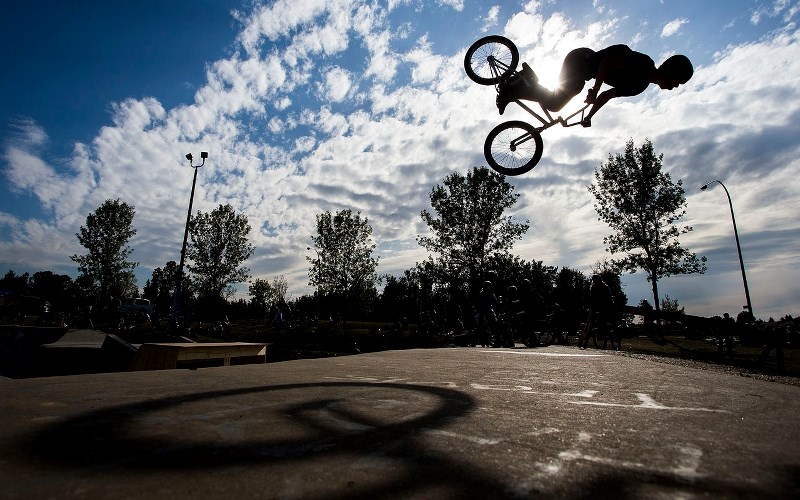It’s amazing to see what well-practised athletes can do with a plank on four wheels – big air, slides, and different flips and twists that are hard to follow with the naked eye.
All that and then some were on display at the Shake Down skateboard and BMX competition at the St. Albert Skateboard Park last Sunday afternoon.
But while to the uninitiated spectator it was maybe all about the trick being performed, for many seasoned veterans, the competition is pretty low on their priority list.
Vinny Tubbs grew up in St. Albert and although he has since moved to Edmonton, he returned to his old stomping grounds over the weekend. He wasn’t competing due to an injured ankle, but wanted to support the scene.
For him, skateboarding was never just about pulling off the biggest trick. Rather, it’s about an escape from the tedium of everyday life.
“You don’t have anyone telling you what to do, you just go hit the streets and you can be by yourself,” he said.
Zach Reid said much the same thing, even balking at the notion of skateboarding as an organized sport with winners and losers.
“I wouldn’t even call it a sport, it’s a lifestyle,” he said. “It has its own community and culture.”
He explained that for him, like many kids who get involved with skateboarding, the attraction initially came out of a desire to rebel against different authority figures in his life, and while that aspect has diminished in adulthood the core of the culture remains, and so does his own motivation.
“You can just pick up and ride,” Reid said. “Especially when you’re a kid and you have that angst in your life – ‘Mom wants me do the dishes, I just want to go ride’ – then when you grow up life happens and you still just want to go ride.”
While he appreciates the bump in popularity the sport has received with the advent of big-ticket competitions like the X-Games, it doesn’t tell the full story of what skateboarding is really all about.
“It touches on what we do every day – obviously at a whole new level – but at the same time it’s just a part of what we do every day,” he said.
Skateboarding as it exists today really began to take off in the early 1990s with professionals like Tony Hawk and Rodney Mullen helping to propel it into the mainstream. There were very few options for skateboarders in the early days, and the Edmonton area in particular was short on options.
Without access to any sort of skate parks that now proliferate in the urban landscape, skaters would typically use private property to make any staircase or park bench their playground.
Andrew Brown, who owns the skateboard company Riot, said in many cases this helped contribute to a certain stereotype of skateboarders – being hooligans, punks and rebels – that didn’t necessarily endear the culture to the mainstream.
Beneath the surface, however, he said even if there are a few jerks out at the skateboard park sometimes, that shouldn’t be taken as a reflection of the community as a whole.
“When you get to know anyone who’s in the sport, it’s always about the love of the sport and the people they’re with,” he said.
In his own experience, he said he has seen how skateboarding can transcend culture and language, helping people find commonality despite drastically different circumstances.
As an example, he described a trip to Cuba he took with a group of other skateboarders, and found that despite the trade restrictions hugely limiting Cubans’ access to skateboarding gear, there is a strong skateboarding culture in that country.
“To see a country that has no way of getting it have that many people skateboarding, just goes to show that borders don’t matter,” he said. “Customs don’t matter. It’s all about the love of your other skaters.”
As for the competition itself, Brown said he was really happy to see a crowd of a few hundred people out supporting skateboarding in St. Albert, but said he has a hard time with the idea of attributing absolute and quantifiable results to any given skater.
“In soccer, for example, you have an end game. You have rules and can tell who won,” Brown said. “You can’t really judge skateboarding style. Every skater is unique in their own way.”
Every skateboarding spot, whether an official park or an out-of-the way rail or stair-set downtown somewhere, has its own unique properties and every skateboarder can look at it in a different way – fostering a spirit of creativity and co-operation rather than any sort of real competition between different skaters.
“There’s so many times you’re out skating and you’ll see something. He’ll hit it his way, then someone else will come over and hit it differently and just change the whole spot,” Brown said.
While there are few high-profile skaters coming out of the Edmonton area – in no small part due to the fact our long winters make outdoor skateboarding nearly impossible for several months out of the year – Reid pointed out that doesn’t mean there isn’t some world-class talent in the area.
As such, there aren’t really many sponsored skaters and almost none are able to do it for a living. But for Reid, that doesn’t make much difference and the money wouldn’t change his attitude regardless.
“You can’t tell me how to skate or why to skate, I’m just going to skate,” he said.




